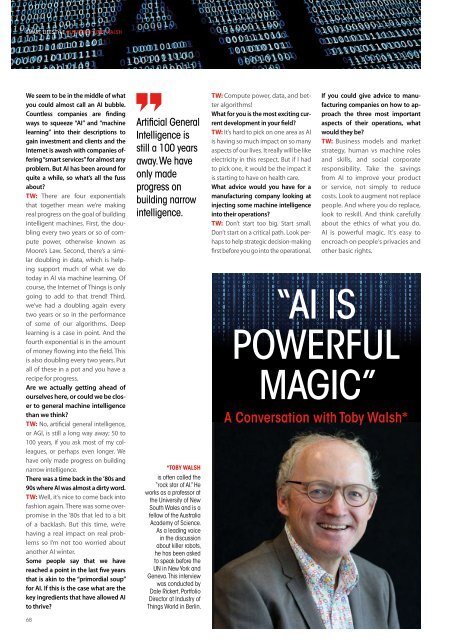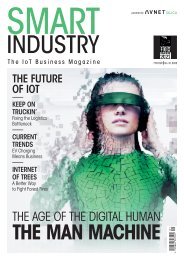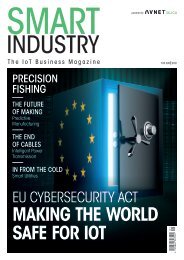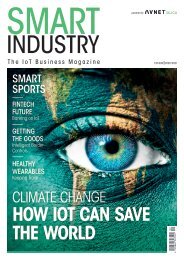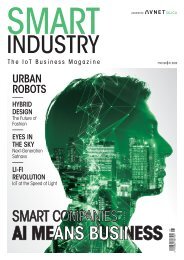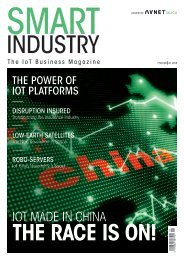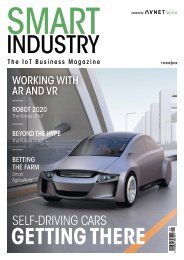Smart Industry 2/2018
Smart Industry 2/2018 - The IoT Business Magazine - powered by Avnet Silica
Smart Industry 2/2018 - The IoT Business Magazine - powered by Avnet Silica
You also want an ePaper? Increase the reach of your titles
YUMPU automatically turns print PDFs into web optimized ePapers that Google loves.
<strong>Smart</strong> lifestyle Interview: Toby Walsh<br />
We seem to be in the middle of what<br />
you could almost call an AI bubble.<br />
Countless companies are finding<br />
ways to squeeze “AI” and “machine<br />
learning” into their descriptions to<br />
gain investment and clients and the<br />
Internet is awash with companies offering<br />
“smart services” for almost any<br />
problem. But AI has been around for<br />
quite a while, so what’s all the fuss<br />
about?<br />
TW: There are four exponentials<br />
that together mean we’re making<br />
real progress on the goal of building<br />
intelligent machines. First, the doubling<br />
every two years or so of compute<br />
power, otherwise known as<br />
Moore’s Law. Second, there’s a similar<br />
doubling in data, which is helping<br />
support much of what we do<br />
today in AI via machine learning. Of<br />
course, the Internet of Things is only<br />
going to add to that trend! Third,<br />
we’ve had a doubling again every<br />
two years or so in the performance<br />
of some of our algorithms. Deep<br />
learning is a case in point. And the<br />
fourth exponential is in the amount<br />
of money flowing into the field. This<br />
is also doubling every two years. Put<br />
all of these in a pot and you have a<br />
recipe for progress.<br />
Are we actually getting ahead of<br />
ourselves here, or could we be closer<br />
to general machine intelligence<br />
than we think?<br />
TW: No, artificial general intelligence,<br />
or AGI, is still a long way away; 50 to<br />
100 years, if you ask most of my colleagues,<br />
or perhaps even longer. We<br />
have only made progress on building<br />
narrow intelligence.<br />
There was a time back in the ’80s and<br />
90s where AI was almost a dirty word.<br />
TW: Well, it’s nice to come back into<br />
fashion again. There was some overpromise<br />
in the ’80s that led to a bit<br />
of a backlash. But this time, we’re<br />
having a real impact on real problems<br />
so I’m not too worried about<br />
another AI winter.<br />
Some people say that we have<br />
reached a point in the last five years<br />
that is akin to the “primordial soup”<br />
for AI. If this is the case what are the<br />
key ingredients that have allowed AI<br />
to thrive?<br />
68<br />
Artificial General<br />
Intelligence is<br />
still a 100 years<br />
away. We have<br />
only made<br />
progress on<br />
building narrow<br />
intelligence.<br />
*Toby Walsh<br />
is often called the<br />
“rock star of AI.” He<br />
works as a professor at<br />
the University of New<br />
South Wales and is a<br />
fellow of the Australia<br />
Academy of Science.<br />
As a leading voice<br />
in the discussion<br />
about killer robots,<br />
he has been asked<br />
to speak before the<br />
UN in New York and<br />
Geneva. This interview<br />
was conducted by<br />
Dale Rickert, Portfolio<br />
Director at <strong>Industry</strong> of<br />
Things World in Berlin.<br />
TW: Compute power, data, and better<br />
algorithms!<br />
What for you is the most exciting current<br />
development in your field?<br />
TW: It’s hard to pick on one area as AI<br />
is having so much impact on so many<br />
aspects of our lives. It really will be like<br />
electricity in this respect. But if I had<br />
to pick one, it would be the impact it<br />
is starting to have on health care.<br />
What advice would you have for a<br />
manufacturing company looking at<br />
injecting some machine intelligence<br />
into their operations?<br />
TW: Don’t start too big. Start small.<br />
Don’t start on a critical path. Look perhaps<br />
to help strategic decision-making<br />
first before you go into the operational.<br />
If you could give advice to manufacturing<br />
companies on how to approach<br />
the three most important<br />
aspects of their operations, what<br />
would they be?<br />
TW: Business models and market<br />
strategy, human vs machine roles<br />
and skills, and social corporate<br />
responsibility. Take the savings<br />
from AI to improve your product<br />
or service, not simply to reduce<br />
costs. Look to augment not replace<br />
people. And where you do replace,<br />
look to reskill. And think carefully<br />
about the ethics of what you do.<br />
AI is powerful magic. It’s easy to<br />
encroach on people’s privacies and<br />
other basic rights.<br />
“AI is<br />
Powerful<br />
MAGIc”<br />
A Conversation with Toby Walsh*


